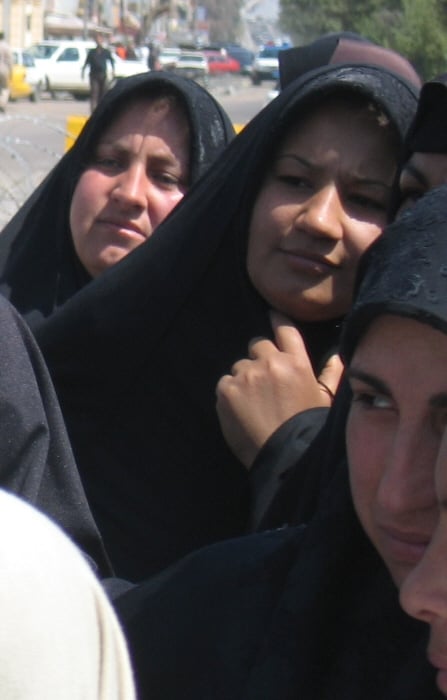Until 2003, Salwa Khatab Omar, had been driven around by two drivers and accompanied by at least three guards who lived in a caravan next to her house in Baghdad. She lived in some style and without many responsibilities.
Since the 2003 US-led invasion, however, Salwa, the wife of a former senior army officer, has found herself responsible for virtually everything.
"My husband can't leave the house at all for fear of being targeted like other former regime officials," said Khatab, a 51-year-old mother of four.
"Unlike before, I have to accompany my sons and daughters to their schools and colleges in addition to dealing with other household stuff," said Khatab. She said they had to leave their home and rent a house where nobody knows her husband and his background.
Iraqi men are traditionally the breadwinners, while most women take care of other duties inside the house.
Iraq's continuing violence, however, especially with threats against men, has forced some women to take on more family responsibilities - a phenomenon called "gender role swap" by some specialists.
"Our society does not respect a man who sits at home while his wife works and feeds the family," said Kholoud Nasser Muhssin, a researcher on family and children's affairs at the University of Baghdad.
"This phenomenon will definitely weaken the role of the father and reduce respect among children for their fathers in some families. It will adversely affect an already devastated society," Muhssin added.
Mainly men killed in violence
Since February 2006, when the golden dome of a revered Shia shrine north of Baghdad was blown up, Iraq's two major Muslim sects have been plunged into spiralling sectarian killings.
A study published last year by the respected UK medical journal, The Lancet, found that men accounted for 91 percent of the violence-related deaths in Iraq.
The controversial study, which was based on a survey of households in Iraq, but not on an actual body count, contended that nearly 655,000 Iraqis had died in three years of conflict in Iraq - over 10 times more than other independent estimates of the toll.
Women collect bodies of dead relatives
Two weeks ago, Fawziya Ibrahim Mohammed, a 36-year old housewife and mother of four, went through a grim experience when she had to go to downtown Baghdad to claim the bodies of her brother and two cousins from the main morgue: “Men would definitely be kidnapped and killed by Shia militia," she said.
The three were allegedly kidnapped at a checkpoint manned by Shia-dominated police commandos south of Baghdad and handed over to the al-Mahdi army, a Shia militia loyal to radical religious leader Muqtada al-Sadr who is blamed for many killings.
Their bullet-riddled bodies were found next day dumped in the street with their legs and hands tied. There were signs they had been tortured.
Conversely, Shia men have stopped travelling through Sunni-dominated areas, where Sunni militants are active, in order not to be kidnapped and killed.
Last month, Abdul-Zahra Nassir Jumaa could not accompany his son's funeral procession to the southern city of Najaf, about 200km south of Baghdad, where Shias usually bury their dead.
"We sent only the women, with a Sunni driver, as they had to get through Sunni-dominated areas in southern Baghdad where Sunni militants snatch Shia men and behead them immediately," Jumaa, a 55-year old Shia father, said.
Muhssin said that - with many men fleeing the country, keeping a low profile at home, or in prison - more responsibilities would be transferred to women in the future.
"If the security situation continues to deteriorate we will see women working as taxi or truck drivers; more of them will work in shops or as technicians or mechanics."
sm/at/cb
see also
Adeela Harith, “I have to scrounge around rubbish bins to feed my children”
This article was produced by IRIN News while it was part of the United Nations Office for the Coordination of Humanitarian Affairs. Please send queries on copyright or liability to the UN. For more information: https://shop.un.org/rights-permissions





